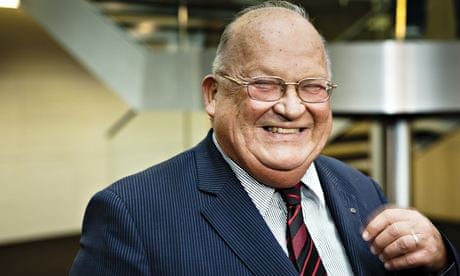Jean-Luc Dehaene, who has died aged 73, was a Belgian prime minister and ardent European federalist whose backroom negotiating skills helped keep his country together during its greatest trials. Dehaene wrenched compromise from Belgium's intractable quandaries, including the royal succession, a paedophile scandal, Belgium's entry into the euro and countless wrangles between its bickering French and Dutch-speaking communities.
A Flemish Christian Democrat, he had an ability to reconcile squabbling factions that almost propelled him to the presidency of the European commission in 1994, but his zeal for federalism led the British prime minister John Major to veto his candidacy.
Dehaene's death, just 10 days before Belgians head to the polls in joint European, national and regional elections, seems to mark the passing of an era: Belgium's recent political upheavals have been attributed to the dearth of operators like Dehaene, able to roll up their sleeves and hammer out a compromise from seemingly irreconcilable positions.
As prime minister from 1992 to 1999, he steered constitutional reforms that turned the country into a federal state by introducing direct elections for the parliaments of Belgium's regions and language communities. His centre-left coalitions addressed Belgium's disastrous public finances, and his budgetary reforms, often bypassing parliament, helped ensure the country became one of the euro's founding countries in 1999 despite it having Europe's highest national debt.
Dehaene's career was characterised by a canniness that seemed at odds with his avuncular appearance. Son of Albert, a Bruges neuropsychiatrist, and Andrée (nee Verstraete), he was born in Montpellier, France, while his family fled the invading German army. He attended a Jesuit school, and studied law and economics at the universities in Namur and Leuven. Dehaene came relatively late to politics, in his 30s, but it was on the back of social activities such as running the Flemish scouts and the youth movement of the Christian Democrats.
Dehaene joined the staffs of different ministers, eventually becoming cabinet secretary for the then prime minister, Wilfried Martens. He was made social affairs minister in 1981, and he became deputy prime minister and minister of communications and institutional reform in 1988.
Appointed prime minister in 1992 at the head of a four-party coalition, Dehaene quickly impressed friends and opponents with his arm-twisting, his mastery of detail and his capacity to forge complicated and intricate deals that seemed to satisfy everyone.
He had a number of nicknames: the Plumber, for his ability to unblock the foulest of messes, the Carthorse and the Bulldozer for his plodding persistence, and the Minesweeper for his problem-solving. He relished his sobriquets and never saw compromise as a weakness. "The institutional problems of Belgium require compromise, which is sometimes complicated," he said in 2009. "But as long as there are no leaks, it's a good job – and plumbers are usually well paid."
His two governments faced several crises. In 1993, Dehaene personally negotiated King Albert II's ascent to the throne after the death of his brother, Baudouin I. After 10 Belgian peacekeepers were murdered in Rwanda in 1994, he pulled Belgian forces from the country, which critics say cleared part of the way for the subsequent genocide that left 800,000 dead.
The biggest crisis, however, came in 1996 after the murder of four girls by a convicted sex offender, Marc Dutroux. Public outrage was as much focused on police failings as the crimes themselves: although Dutroux's house was searched three times, the secret basement where he hid the girls was not found. A subsequent White March protest against the justice system brought 300,000 people on to the streets of Brussels.
Still, as the elections approached in 1999, Dehaene's administration looked set for re-election. But then cancer-causing dioxins were discovered in Belgian animal feed, and his government was seen as trying to orchestrate a cover-up until after the elections. Amid heavy losses, Dehaene withdrew from frontline politics. He was succeeded by the Flemish liberal Guy Verhofstadt leading a coalition with socialists and greens.
After leaving office, Dehaene devoted much of his energy to Europe. He was vice-president of the Convention on the Future of Europe, which led to the EU constitution; although it was later rejected in referendums, the constitution became the basis of the EU's Treaty of Lisbon. And he was elected to the European parliament in the 2004 and 2009 elections; he was vice-chairman of the budget committee at the time of his death. After being diagnosed with pancreatic cancer, he did not seek re-election as an MEP.
In 2008 he was appointed chairman of the troubled Belgian-French bank Dexia, and he helped stave off collapse by negotiating a €6.4bn Belgian and French government bailout. He also joined the boards of the brewing giant AB InBev, the industrial conglomerate Umicore, the biopharmaceutical firm ThromboGenics and Lotus Bakeries.
More recently, Dehaene, a keen fan of the Belgian side Club Brugge, headed Uefa's club financial control board, investigating the influence of money on club football. It is unclear what effect his death might have on the expected announcement next week of Uefa sanctions on high-spending clubs such as Manchester City and Paris Saint-Germain.
With a brusque, earthy personality, and a portly figure, Dehaene seemed an unlikely vote-winner. He had an eclectic taste in clothing, and was happy to be pictured dressed in a cowboy outfit on a mechanical bull, in a mariachi outfit, or arriving at a TV studio in T-shirt, Bermuda shorts and sandals.
In 2005, Dehaene and his US-born wife, Celie Verbeke, published Cooking with Celie, a selection of favourite recipes. He is survived by Celie, whom he married in 1965, and their children, Mieke, Koen, Tom and Hilde.

Comments (…)
Sign in or create your Guardian account to join the discussion